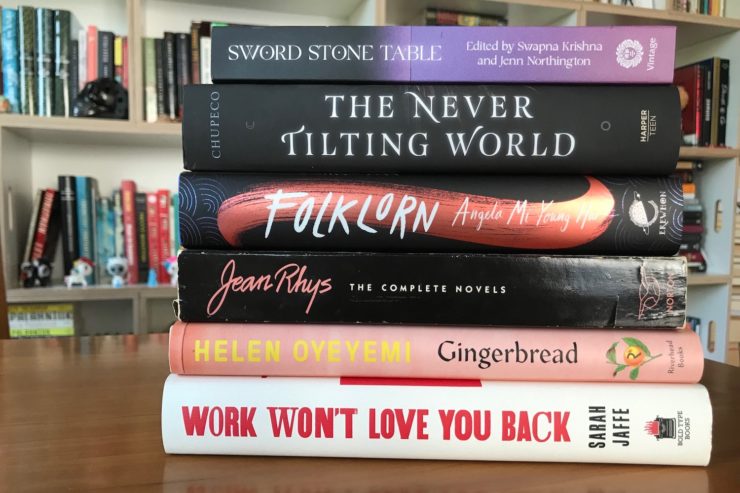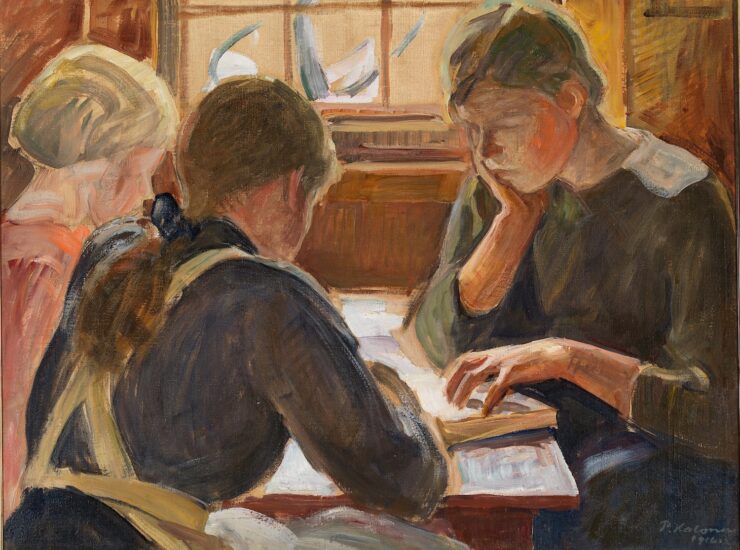One book on my unread books shelf has been there for almost twenty years. It’s a copy of Jeffrey Eugenides’ Middlesex, a book I was once giddily excited about. When it was published, I was working for the kids’ division of his publisher, and though I had very little interaction with the folks on the adult-books side of things, I knew that if I could just summon up enough courage to go ask, I could maybe get an advance reader’s copy. I was shy and anxious, but I went upstairs, found his editor’s assistant, and asked, nervously, if I could possibly have a copy of the upcoming Eugenides.
I had never heard anyone say the name “Eugenides” out loud. “Oh,” said the assistant. His face was not kind. “Do you mean Jeffrey you-GEN-ih-dees?”
I got the book, but I was mortified. Eventually, I read part of Middlesex, then set it aside. A mystifying receipt for a six-pack, two bags of chips, and two bags of marshmallows marks my stopping place at page 79.
I can’t let that copy go. I may read it someday. Mostly it sits on the shelf and reminds me not to be a snob. In that way, it serves a purpose. But do the several hundred other unread books also serve a purpose?
If you want someone to tell you to hoard unread books, you can find a lot of people who will do just that. Many cite the essay in which Nassim Nicholas Taleb argues, “Read books are far less valuable than unread ones.” Taleb calls a collection of unread books an “antilibrary,” an awkward word with a lovely meaning: the books you haven’t read are a reminder of how much you have left to learn.
Other writers refer to tsundoku, “a Japanese word for a stack of books that you have purchased but not yet read,” according to The New York Times. It’s one of those words that feels like magic: having a term for the thing makes the thing feel more real, more legitimate. The sense that it’s a shared experience is stronger when there’s a word for it.
Last year, I bought more books than I’ve bought for a long time. Getting mail was one of 2020’s greatest small joys—getting book mail, doubly so. For years, I’ve worked in jobs that kept me in a steady stream of free or cheap books: publishing, arts editor at an alt-weekly, bookseller. This rich access to books is something I try very hard not to take for granted. When I was younger, I didn’t own extra unread books. I got stacks from the library, or I went to a bookstore and painstakingly picked out one book at a time. But eventually, through happenstance, choice, and privilege, the books began to pile up.
Unread books now exist in three states for me: Actual books, piled horizontally on a five-foot-wide bookcase; books listed in a tab on my reading spreadsheet, some sorted by category or interest; and the many books I’ve tagged “to-read” in my library app. There are probably some unread books on my iPad, too, but I try really, really hard not to buy ebooks I’m not going to read right away, as out of sight is out of mind and I will forget about them.
You could say books exist in two broad categories: read and unread. You could easily argue for a third: the semi-read books and the books that aren’t really meant to be read straight through (coffee-table books, reference books, art books).
But what about the books that slip through the fingers of a reader’s intentions?
In 2013, I read a Tumblr post that I’ve thought about regularly ever since. In it, author and PhD Jennifer Lynn Barnes addresses a phenomenon book-hoarders rarely mention: the way that a book can come to seem less appealing when it’s been sitting on your to-be-read shelf for a while:
Back in the 1950s, Leon Festinger proposed a concept called Cognitive Dissonance, which basically refers to a discomfiting state in which our actions and beliefs don’t line up. … One of the classic experiments of cognitive dissonance involves a choice task, where participants are asked to rate a bunch of “prizes” on how much they like them. Later, they are offered a choice between two prizes that they initially rated as equally appealing. Then, after participants finally make their choice, they’re asked to rate all of the prizes again. And basically what happens is that participants, on average, like the thing that they chose MORE than they did before they chose it, and they like the non-chosen item LESS. (This effect even persists with monkeys and children).
All of which is a very roundabout way of saying that a few years ago, I realized my To Be Read pile was recreating this experiment almost exactly. Every time I chose to read Book A and not Book B, Book B would become a little less appealing, even if I chose Book A because I was in the mood for that particular genre, or because a friend wanted to talk to me about it, or because Book B was longer and I didn’t have enough time to finish it, or because Book B was a hardback and wouldn’t fit in my purse, and NOT because I just wanted to read Book A more. But then, after not-choosing Book B, the next time I came back to my TBR pile, I would choose Book C over Book B, too… and so on and so forth until I didn’t really want to read Book B at all.
If you’re a person who just wants to have books, this may not bother you. Collecting books is a fine and noble pursuit, especially if you have the shelf/floor/nightstand space. But 90-95% of the books on my shelves are there because I genuinely want to read them. I ordered them or picked them out in a store or brought them home with enthusiasm and great intentions.
And then I didn’t read them. I picked other books instead—maybe the one I just got in the mail yesterday. Maybe a hold that came up at the library. Maybe a brand-new book I’m reviewing. Maybe that book I bought six years ago is one that I now think I can put in a nearby little free library—even though, when I bought it, I wanted to read it so much.
I can feel this happening when I look over at my TBR shelf. There are books from just months ago that I was so excited to get and yet I keep not picking up. There are books from years ago that I categorically refuse to part with, but am I going to read them? Would it be better to let them go now, and see if they come back into my life someday in the future, when I find a given book in a store and think Yes, now is the time!?
This doesn’t apply to special editions, or out of print books, the writing/craft/fairy-tale books that serve as my reference section and have a separate shelf. But sometimes I look at the TBR mountain and think, Do I want to climb you? Or was this a foolish dream in the first place?
The trippy thing is that this cognitive dissonance also happens with my lists. I’ve been trying, in the interest of space and saving money, to add books to my want-to-read lists rather than always buying them. (I still buy plenty.) But the more times I look at those lists and don’t pick those books, the more they fade from the forefront of my want-to-read brain. The titles become strings of words that don’t have the meaning, the promise, they once did.
There are very few unread books on my shelf that are as old as that copy of Middlesex. A huge hardcover history of Australia dates to 2006. Several small-press Catherynne Valente books are almost as old. (I read one of them this year, though! It does happen!) But my eye goes to the copy of The Only Good Indians that’s been calling to me for a year or so; am I too much of a horror wimp for it or not? Don’t I want to read Folklorn, with its shiny cover, which I just added to the stack a month or two ago?
I’ve considered declaring a form of TBR bankruptcy—giving away everything more than a year old, or picking some other arbitrary cutoff. Maybe I should arrange the books in order from those I’ve had the longest to those I’ve gotten most recently, and read in that chronology? Maybe I’ll get through them all if I try to alternate each newer book with an old-to-me book?
Like Barnes, I’ve also made smaller, secondary TBR piles—the “immediate TBR,” pictured above, which I fully intend to pull from after I finish what I’m reading. I did this, this week; after finishing David Mitchell’s Utopia Avenue for a book group, I reached for Shelley Parker-Chan’s She Who Became the Sun, which is now face-down on my coffee table, waiting to be picked back up.
The thing about the immediate-TBR, though, is that I keep it stacked with the spines away, so I don’t see them all the time. I know what’s there, but I like to imagine that not seeing them all the time short-circuits a teensy bit of the not-choosing effect. But we’ll see. Will I pick up Gingerbread or Work Won’t Love You Back next? Or will something else new and shiny have caught my eye by then?
The unread book shelf is comforting, in its way. I will never run out of books. Some of them, the ones I’ve been carrying around for years, feel like friends I just don’t know that well yet. We need to go on a friend-date, settle down for a long conversation, get to know each other better. But if I just keep adding more books, will the old ones ever have their day?
There aren’t rules for reading, of course. And some of those books are also there to remind me of something, like how Middlesex reminds me that snobbery accomplishes nothing. But the part of my brain that loves completing tasks and shelving books I’ve just read sometimes stares at the unread-books wall and wonders: What would it be like to catch up? To read them all? To clear the slate?
Molly Templeton lives and writes in Oregon, and spends as much time as possible in the woods.














